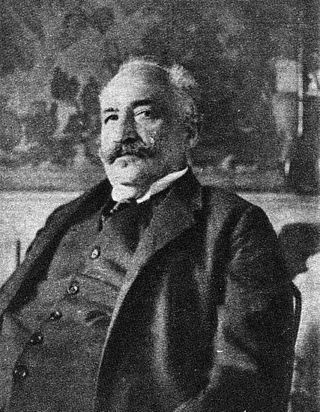
Sachertorte is a chocolate cake, or torte, of Austrian origin, invented by Franz Sacher, supposedly in 1832 for Prince Metternich in Vienna. It is one of the most famous Viennese culinary specialties.

Demel is a famous pastry shop and chocolaterie established in 1786 in Vienna, Austria. The company bears the title of a Purveyor to the Imperial and Royal Court up to today.

Hotel Sacher is a five-star luxury hotel in Vienna, Austria, facing the Vienna State Opera in the city's central Innere Stadt district. It is famous for the specialty of the house, the Sachertorte, a chocolate cake with apricot filling. There is also an art gallery in the hotel, with works from the 19th century. The hotel is located near the former residence of Antonio Vivaldi. Hotel Sacher is a member of The Leading Hotels of the World, a marketing network.

Lily Kronberger, also spelled Lili Kronberger, was a Hungarian figure skater competitive during the early years of modern figure skating. She was Hungary’s first World Champion.

Manner is a line of confectionery from the Austrian conglomerate Josef Manner & Comp AG. The corporation, founded in 1890, produces a wide assortment of confectionery products. These include wafers, long-life confectionery, chocolate-based confectionery, sweets, cocoa and a variety of seasonal products.

Major General Dr. h. c. Eduard Fischer, 1862–1935, Knight of the Maria Theresa Order, was a colonel commanding the Austrian gendarmerie in Bukovina. With the outbreak of World War I, Bukovina was immediately under siege by the Russian armies. The north of Bukovina and Czernowitz, the capital, fell within a month.
Franz "Bimbo" Binder was an Austrian football player and coach who played as a forward. Internationally he represented the Austria national team and, during the Anschluss, the Germany national team.

Archduchess Mathilde Marie Adelgunde Alexandra of Austria was a member of the House of Habsburg-Lorraine as the daughter of Archduke Albert, Duke of Teschen. She was intended to become the Queen of Italy as the wife of King Umberto I, but her early death prevented the marriage.

Josephine Wessely was an Austrian theatre actress.

Anni is a 1948 Austrian-German historical romance film directed by Max Neufeld and starring Elfie Mayerhofer, Siegfried Breuer and Josef Meinrad. It is part of the genre of Vienna films.

The House of Deputies was, from 1861, the lower house of the bicameral Imperial Council parliament of the Austrian Empire and, from 1867 to 1918, of the Cisleithanian lands within Austria-Hungary. The upper chamber was the House of Lords.
Das Sacher: In bester Gesellschaft is an Austrian-German historical drama television series aired in two parts, directed by Robert Dornhelm and written by Rodica Doehnert, and based on the book Das Sacher. Geschichte einer Verführung The series was commissioned by the ORF (broadcaster) and ZDF. The first part was aired on December 27, 2016 on ORF2.

The Lurgrotte karst cave is the largest cave in the Eastern Alps of Styria, Austria. It is located about 16 km (9.9 mi) north of Graz and crosses the Tannenben karst region. The cave has two accessible entrances, one at the village of Semriach and the other at the village of Peggau. At the Semriach entrance, the Lur River sinks into the cave. At the Peggau entrance, the Schmelz River emerges from within the cave, flowing to the west and eventually joining the Mur River.

Archduchess Maria Antonietta of Austria, Princess of Tuscany was a member of the House of Habsburg-Lorraine. She served as the Princess-Abbess of the Theresian Royal and Imperial Convent in Hradčany from 1881 until her death in 1883.
Konrad Adolf Hallenstein, also Conrad Hallenstein was a German actor.

Ignaz Schnitzer was a journalist, translator, librettist and newspaper founder.
Rosa CarolaStreitmann, von Jenny from 1885 and Benvenisti from 1888 was an Austrian operetta singer and singing pedagogue.

Wilhelm Wiesberg, real name Wilhelm Bergamenter, was an Austrian writer and folksinger.

Alexander von Koller was an Austro-Hungarian military officer, who achieved the rank of General of the cavalry and served as Imperial and Royal Minister of War from 1874 to 1876.

Anna Sacher was an Austrian hotel owner and proprietor, who was the owner of the world famous Hotel Sacher. She was the daughter-in-law of Franz Sacher.
















